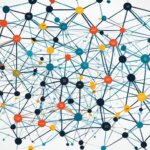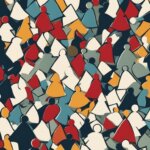Table of Contents
Decentralised Autonomous Organisations (DAOs) are revolutionising the way we think about traditional organisational structures. Built on blockchain technology, DAOs empower members to participate in collective governance and decision-making processes. By harnessing the power of blockchain, DAOs redefine the concept of decentralisation and create a new paradigm for organisational structures.
DAOs operate on the principles of transparency, collaboration, and equality. Unlike traditional hierarchical organisations, DAOs provide a platform where every member has a voice and shares common goals. Through DAOs, individuals can actively engage in decision-making processes and contribute to the growth and development of the organisation.
Blockchain technology forms the backbone of DAOs, enabling secure and transparent transactions and governance mechanisms. Smart contracts, powered by blockchain, enforce the rules and ensure that decisions made within the DAO are executed seamlessly. This eliminates the need for intermediaries and enhances the efficiency of collective decision-making.
With the rise of DAOs, we are witnessing a fundamental shift in the way organisations function. The traditional top-down approach is being replaced by a bottom-up approach that empowers individuals and fosters collaboration. DAOs have the potential to reshape industries and empower communities by creating a more inclusive and democratic framework for decision-making and governance.
In the upcoming sections of this article, we will explore the mechanics of how DAOs work, delve into the differences between DAOs and traditional organisations, and address the potential challenges and risks associated with DAOs. Join us on this journey as we navigate the exciting world of decentralised autonomous organisations and their impact on the future of work and governance.
How Does a DAO Work?
Decentralized Autonomous Organizations (DAOs) function similarly to traditional companies but with a unique twist – they rely on smart contracts instead of conventional rules and hierarchies. DAOs prioritize equality, ensuring every member has a voice and shares common goals. Through internal finances, DAOs facilitate operations and foster collaboration among members. Decision-making within a DAO is driven by democratic voting, with each member’s voting rights represented by digital tokens. Smart contracts verify these tokens and enforce the rules governing the DAO. As a result, DAOs provide a decentralized and transparent approach to decision-making.
To illustrate this further, let’s take a closer look at how DAO mechanics, smart contracts, equality, decision-making, and voting rights intersect:
Smart contracts: Enforcing Transparency and Security
DAOs rely on smart contracts, which are self-executing contracts with the terms of the agreement directly written into lines of code. These contracts ensure transparency and security by automating processes, eliminating the need for intermediaries, and guaranteeing the execution of predefined rules without the possibility of tampering or manipulation.
Equality: Every Member Has a Say
In a DAO, every member possesses an equal right to participate in decision-making processes. This egalitarian principle is achieved through voting rights tied to digital tokens. Regardless of their level of investment or influence, each member has an equal opportunity to contribute to discussions and shape the direction of the organization.
Decision-making: Democracy in Action
DAOs democratize decision-making by involving all members in the process. Whether it’s determining budget allocations, initiating projects, or making strategic choices, decisions are made through a democratic voting system. This allows for a more inclusive approach and ensures that the collective voice of the community is heard.
Voting Rights: Represented by Digital Tokens
To enable fair and secure voting, DAOs assign voting rights to digital tokens held by members. These tokens represent ownership stakes and give individuals a tangible means to express their preferences. Members can use their tokens to cast votes on proposed initiatives, ensuring that decisions reflect the consensus of the community.
“DAOs leverage smart contracts and democratic decision-making to create a decentralized and transparent approach to governance.” – Decentralized Governance Foundation
The Difference between DAO and Traditional Organisations
Decentralised Autonomous Organisations (DAOs) and traditional organisations vary significantly in terms of funding and structure. While traditional organisations depend on founding members and partners for initial funding, DAOs offer a unique approach by enabling investors to become owners and employees through their financial contributions, thus connecting funding to governance powers.
Furthermore, DAOs possess a more decentralised structure compared to traditional hierarchical organisations. This decentralisation promotes collaboration, transparency, and open discussion, allowing every member to actively participate in decision-making processes. Instead of relying on a top-down approach, DAOs encourage a collective effort where the community drives the decision-making, fostering inclusivity and innovation.
Nevertheless, it’s important to note that DAOs face their own set of risks, which include regulatory and governance challenges that must be addressed. However, despite these risks, DAOs continue to gain popularity due to their transparent and efficient operational models, attracting individuals and investors alike who value the benefits of decentralisation and the opportunities it brings.
FAQ
What is a Decentralised Autonomous Organisation (DAO)?
A DAO is the web3 equivalent of a company, where blockchain-based rules control community-driven decision-making. It has a unique corporate structure that allows every member to participate in decision-making.
How does a DAO work?
DAOs utilize smart contracts instead of traditional rules and hierarchies. They prioritize equality and ensure that every member has a say and shares common goals. Internal finances are used to facilitate operations and encourage collaboration. Voting rights are represented by digital tokens, and decisions are made through a democratic voting process.
How does a DAO differ from traditional organisations?
DAOs differ from traditional organizations in terms of funding and structure. Traditional organizations rely on founding members and partners for initial funding, while DAOs empower investors to become owners and employees by connecting financial contributions to governance powers. DAOs also have a more decentralized structure, promoting collaboration, transparency, and open discussion.
What are the advantages of a DAO?
DAOs provide a decentralized and transparent approach to decision-making. They promote inclusivity, innovation, and collective governance. DAOs also have built-in treasuries that members can access for funding, and they change how individuals view and interact with organizations in the digital age.
What are the risks associated with DAOs?
While DAOs offer numerous benefits, they also come with risks. These include regulatory and governance challenges that need to be addressed. However, despite these risks, DAOs continue to gain popularity due to their transparent and efficient operational models.












